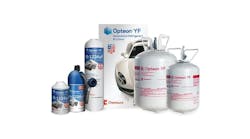Taking care of your trucks during the summer months is just as important as it is in the winter. Like cold weather conditions, summer’s hot and dry weather causes additional stresses on vehicles as well.
Making the time to summarize vehicles will help them take the heat and keep operating efficiently.
A best practice is to start with the truck’s engine cooling system.
Because of the higher temperatures, the cooling system is required to work harder in the summer to keep the engine from overheating. If it is not maintained properly, the engine will not operate as efficiently and internal components could be damaged.
Even one cooling system overheat can severely damage a truck engine.
Research has shown that an estimated 40 percent of engine problems are caused by cooling system failures. Yet, cooling system problems are virtually all preventable.
Here are some preventive maintenance tips to ensure optimal engine cooling system performance and reduced downtime:
- Inspect the radiator inside and out for signs of damage.
- Make sure the cooling system is full and look to see if the coolant is clean and pure, with no rust or other impurities, as these can contaminate the cooling system and cause costly issues.
- Examine the radiator cap for cracks and/or swelling and replace if necessary.
- Check the cooling fan for loose or damaged fan blades.
- Check hoses and lines for excessive mushiness and hardness, cracks and leaks and other signs of deterioration. Be sure all connections are tight to avoid leakage.
- Inspect all belts for wear and tension.
Engine Coolant
Good cooling system preventive maintenance practices include the coolant itself. Using and maintaining a properly formulated coolant prevents rust, dirt, scale and other contaminants from creating engine-damaging “hot spots” in a vehicle’s cooling system.
It is advisable to do an engine coolant analysis. This not only determines coolant condition and additive concentrations, it also identifies other vehicle problems that can show up in the cooling system.
Coolant-analysis programs typically are available in various levels and costs, depending on the number of parameters checked.
Electrical Systems
Here are some measures to follow to prep the truck’s electrical system for summer operation:
- Examine the electrical wiring to make sure wires haven’t come loose. Be on the lookout for frayed or cracked insulation and for rubbing against any abrasive items. Also look for signs of corrosion. Make any necessary repairs.
- Check starter and alternator connections and ground wires to ensure that all connections are both clean and tight.
Batteries
Batteries need additional attention because battery degradation occurs much more rapidly in hot weather. Here are some battery summerizing tips:
- Check the batteries to see if the cases are bulging, cracked or leaking and to be certain they are firmly mounted in place.
- Examine the integrity of the battery cables where they connect to the battery and make sure the fasteners are secure.
- Inspect the battery cables to assure they aren’t in contact with items that will wear through their insulation.
- Look for corrosion at the battery’s terminal posts. If corrosion is present, clean it off and spray the connections with a protectant.




